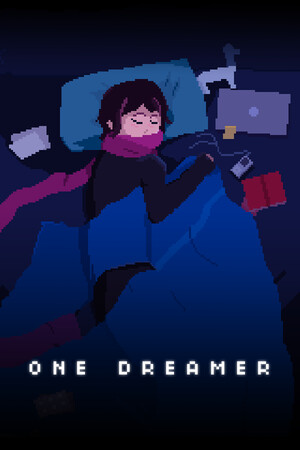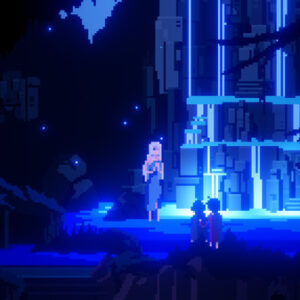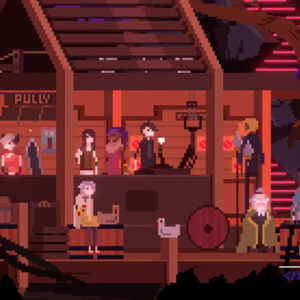One Dreamer Free Download Direct Steam-Cracked
In a gaming world oversaturated with action-packed spectacles and flashy mechanics, One Dreamer dares to take a softer, more meaningful path. Developed almost entirely by a single person—Gareth Ffoulkes—this indie masterpiece is not just a game; it’s a narrative experience, a puzzle-driven meditation on burnout, creativity, and rediscovery. In this article, we’ll delve into what makes One Dreamer such a standout title in the indie game scene, from its emotional storytelling to its unique gameplay mechanics and cultural impact. Prepare for an 8000-word deep dive into the soulful world of One Dreamer.
The Premise: Help Frank Find His Way Back
At its core, One Dreamer follows the story of Frank, a once-passionate indie game developer who has lost his drive. Battling burnout, self-doubt, and the pressures of launching his debut game, Frank becomes a relatable symbol for anyone who’s ever chased a dream only to question if it was worth it. As players, we join him on this introspective journey, helping him debug not only his code but also his life.
This journey is not a traditional hero’s tale. It’s messy, nonlinear, and deeply personal. The story begins with a flashback, immersing us in Frank’s early passion for video games. As he stares at lines of broken code, we’re reminded of how dreams often fall apart. Yet through grit and connection, Frank tries to rebuild.
Unique Selling Points That Define the Game
What makes One Dreamer stand out from a sea of indie titles? Here’s a breakdown:
- Narrative-Driven Puzzle Gameplay: Unlike traditional puzzlers, One Dreamer uses programming logic as its primary gameplay mechanic.
- Emotional Storytelling: Every scene, every puzzle, and every dialogue pushes the story forward.
- C#-Inspired Pseudocode: The coding system is easy enough for beginners but satisfying for experienced programmers.
- Stunning Pixel Art Environments: Each backdrop is drawn pixel-by-pixel with deep atmosphere.
- Full English Voice Acting: Characters feel authentic and emotionally grounded.
- Original Soundtrack: Composed over seven years, it perfectly complements the game’s emotional beats.
These features aren’t just bullet points—they form the emotional and mechanical foundation of the game. One Dreamer is built from passion, with each component reinforcing the story’s themes and gameplay loops. It’s a seamless fusion of design and emotion.
Gameplay Mechanics: Coding Your Way Through the Story
The heart of One Dreamer lies in its innovative coding puzzles. Frank interacts with various objects in his world—computers, mini-games, devices, even toasters—by editing simple lines of pseudocode. This code governs how objects behave. For example, changing a vending machine’s code might dispense a new item or trigger a hidden cutscene.
The genius of the system is its accessibility. You don’t need to be a developer to solve puzzles. Each problem teaches a new concept—loops, conditionals, booleans—without jargon or complexity. It’s educational, yet fun; technical, yet emotional.
Coding becomes a language of healing. A broken loop may signify Frank’s mental state. An unreachable variable mirrors his unattained dreams. Debugging is not just problem-solving—it’s symbolic therapy.
Storytelling That Hits Home
Every interaction in One Dreamer is wrapped in narrative. Whether Frank is debugging a nostalgic childhood game or fixing a bug that halts development progress, the game cleverly uses coding as a metaphor for life. His conversations with Luna, his friend and partner, add emotional depth, capturing the tension between personal dreams and shared goals.
The emotional weight is enhanced by full English voice acting. The cast brings Frank’s depression, anxiety, and occasional humor to life, immersing players in his emotional journey.
Frank’s Journey Through the Chapters
Frank is not your typical hero. He’s tired, worn out, and emotionally frayed. Yet, as players guide him through each level and puzzle, they’re not just progressing through a game—they’re helping someone heal. Frank’s journey is divided into several chapters, each representing a phase of his development and mental state:
- Burnout – Frank is stuck in a loop of overwork, unable to finish his dream game.
- Reflection – Through flashbacks, we see what made Frank fall in love with coding.
- Connection – Conversations with Luna and others rekindle his creative spark.
- Redemption – Frank begins to rediscover his passion and finishes his game.
Each chapter is packed with symbolism. The game design gradually shifts to reflect Frank’s emotional progress. Colors return to dull environments, puzzles become more intuitive, and Frank’s tone becomes lighter.
Environmental Storytelling and Pixel Art
The pixel art in One Dreamer isn’t just aesthetic—it’s an emotional storytelling tool. Each setting reflects Frank’s state of mind. His apartment is cluttered and dim during moments of despair. Nostalgic levels glow with warm tones. Dream sequences are surreal and disjointed. This visual storytelling adds another layer of immersion.
Every asset is hand-drawn. Small details like coffee stains, open notebooks, and flickering monitors add layers of realism. These visuals evoke empathy, pulling players deeper into Frank’s world.
Music and Sound Design
Music in One Dreamer is not just background—it’s an emotional anchor. The soundtrack, developed over seven years, is filled with ambient tones, melancholic piano, and subtle digital effects. Every track has a narrative purpose:
- “Startup” Theme: A hopeful but hesitant piano piece.
- “Debugging Memories”: Echoes of nostalgia and loss.
- “Final Build”: A crescendo of triumph and closure.
Sound design adds richness to the game. Keyboard clicks, the soft hum of monitors, ambient rain—each sound deepens immersion.
Voice Acting and Character Immersion
The cast of One Dreamer deserves special mention. The voice acting is raw and realistic. Frank’s sighs, Luna’s concern, and the minor characters’ quirks breathe life into the story. These aren’t just characters—they feel like people.
Dialogue in One Dreamer is sharp and emotionally honest. The acting adds gravity to simple lines, making the emotional moments land harder.
Educational Value: Learn While You Play
One Dreamer subtly teaches programming. Through coding puzzles, players learn:
- Boolean logic
- Loops and conditionals
- Functions and variables
This makes it a perfect tool for:
- New developers looking to understand basic logic
- Students in programming or game design
- Gamers curious about how code works
The game’s learning curve is gentle but rewarding. It’s interactive education wrapped in storytelling.
Cultural Impact and Community Support
Since its release, One Dreamer has built a dedicated community. Forums and social media platforms are filled with:
- Fan art and cosplay
- Soundtrack remixes
- Personal stories of inspiration
- Discussions on burnout and mental health
The community’s passion reflects the game’s emotional resonance. It has become more than a game—it’s a movement of support and shared healing.
Comparing One Dreamer to Other Indie Titles
How does One Dreamer compare?
- Stardew Valley: More mechanics-heavy; One Dreamer is narrative-rich.
- Celeste: Both explore mental health but use different genres.
- Undertale: Similar in heart and indie charm, but with distinct gameplay.
One Dreamer sets itself apart with its introspective depth and coding mechanic.
Developer Story: Gareth Ffoulkes’ Indie Triumph
Gareth’s personal journey mirrors Frank’s. He faced delays, burnout, and doubt. But he persisted. Over several years, he:
- Designed and coded the game solo
- Composed the soundtrack
- Handled marketing and community engagement
His transparency through devlogs and updates built trust and loyalty. It’s a story of creative perseverance.
Technical Brilliance Under the Hood
Some under-the-hood highlights:
- Custom pseudocode engine in Unity
- Real-time event updates from player code edits
- Smooth performance even on older systems
One Dreamer is a technical marvel of indie development, optimized with love.
Marketing and Launch Execution
Gareth used smart strategies:
- YouTube devlogs
- Twitter sneak peeks
- Early demos to influencers
- Community-driven wishlists
Without a big publisher, the game gained traction organically, riding a wave of word-of-mouth.
Post-Launch Updates and Developer Interaction
Since release, Gareth has:
- Released bug fixes
- Polished voice acting
- Added quality-of-life improvements
He remains active on forums, valuing feedback and fostering a responsive community.
Symbolism Within the Game
Objects in One Dreamer are metaphorical:
- Toaster: Repetition and burnout
- Mini-games: Lost potential and forgotten joy
- Bugs: Emotional issues manifesting as code errors
- Light levels: Mental clarity and hope
Every interaction is symbolic storytelling.
Fan Art, Mods, and Extended Engagement
The modding community has embraced the game. Fans have created:
- Custom puzzles
- Themed UI mods
- Lo-fi remixes of the soundtrack
- Story-driven mods
One Dreamer thrives on player creativity.
Legacy and Long-Term Impact
One Dreamer is destined to become a classic. It’s already being used in:
- Coding bootcamps
- Game design curriculums
- Discussions on mental health in media
It’s not just a game—it’s a beacon of artistic integrity and emotional resonance.
Final Thoughts: One Dreamer’s Place in Gaming History
Few games marry code and heart as seamlessly as One Dreamer. It’s a story of failure, resilience, and triumph. It teaches us that dreams are worth chasing—even if they take years to fulfill.
Continuing the Journey
As the credits roll and the final scene fades, One Dreamer leaves a lasting impact not only through its heartfelt story but also through the quiet message it delivers: creativity is a journey filled with setbacks, but each bug fixed is a step forward. It encourages us to keep going, to dream one more time, and to embrace the beauty of imperfect progress.
SYSTEM REQUIREMENTS
- OS: Windows 7
- Processor: 2.0 GHz+, 64-bit
- Memory: 1 GB RAM
- Graphics: Direct X 11+/OpenGL 3.3+, OpenCL 1.0+
- Storage: 2 GB available space
Game Insights
- Genre: Adventure, Indie
- Developer: F2House
- Platform: PC
- Game Size: 637 MB
- Released By: GOG
- Version: v1.0.6 | Full Version
- Full PC Games


